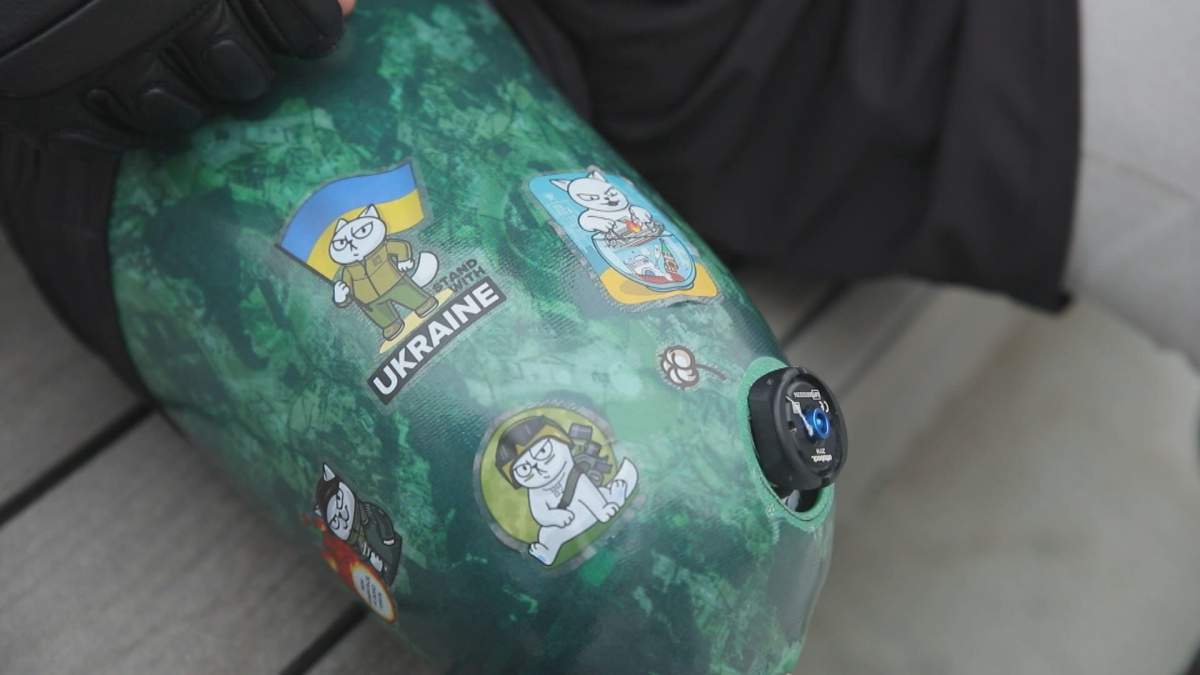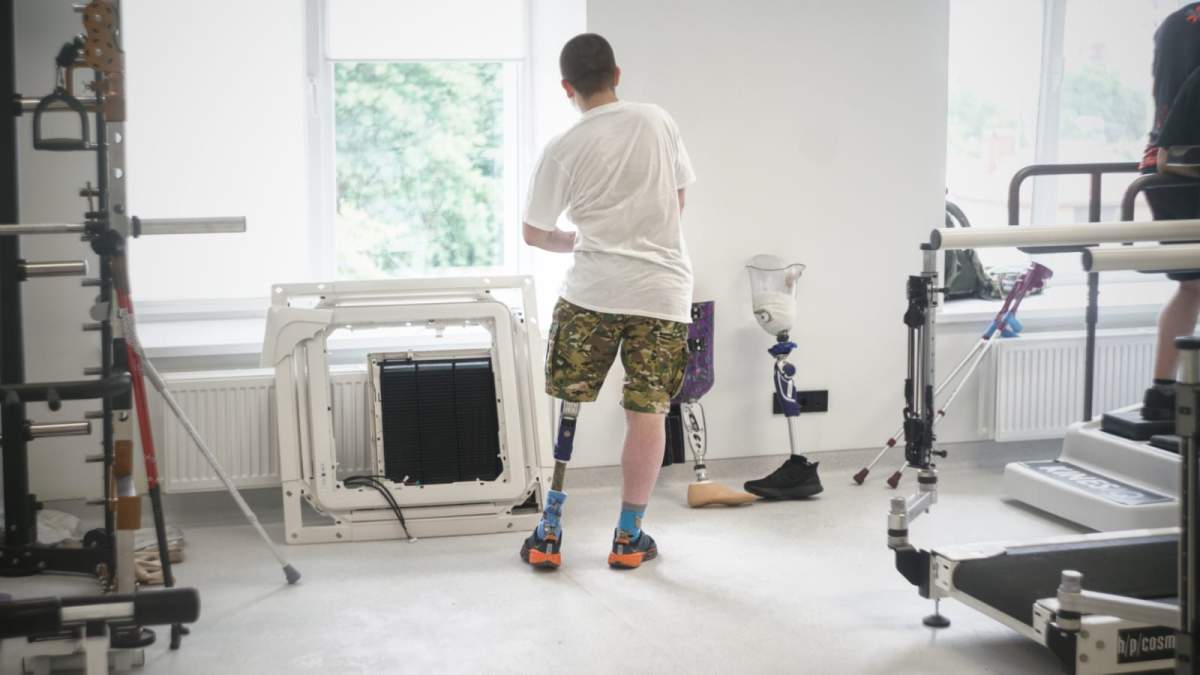Sitting on a bench outside the Superhumans Centre in Lviv, Ukraine, Serhii Kopyshchyk explains the five stickers on his right leg prosthetic socket.

There is an army cat standing proudly in front of the Ukrainian flag and one of a cat holding what looks similar to the Russian Moskva warship, which sank after a fire that was reportedly caused by two Ukrainian anti-ship missiles on April 14, 2022.
The cat is the mascot of a Ukrainian online bank and the stickers make the 25-year-old smile as he looks at them.
He lost both of his legs when he and his fellow brigade members were shelled between Mykolaiv and Kherson regions in July 2022, an area Global News reported from in August of last year.
“During the shelling I lost my left leg, it was torn off. My right leg was very badly damaged, then five shrapnel (fragments) in my right eye, damaged intestines and a punctured lung. The right side of my body was partially burned,” Kopyshchyk said as he touched the different areas as he listed off his injuries.
Despite it all, he calls himself optimistic.
Global News had just arrived at the Superhumans Centre and was about to head into the facility with the CEO when Kopyshchyk started to head down the two sets of stairs out front.
Olga Rudneva stopped to marvel at the site and quickly pulled out her mobile phone to document every step.
“Super, super,” she cheered before turning to our crew to brag that Kopyshchyk was very quick to be rehabilitated.
“He started walking, like, the third day, which is very unusual for a person who doesn’t have a knee and is a double amputee.”
Kopyshchyk has only been using his prosthetics for one month but he’s motivated.
“I (will) have a son in two months, and my dream is to meet her (his wife) from the maternity hospital standing on my own two feet and then holding my son confidently,” he said.

The team at the Superhumans Centre looks for those dreams to spur on their patients.

Get breaking National news
The centre works with some citizens but mostly wounded soldiers, providing them with prosthetics and rehabilitation services.
“You’re coming here to restore your lost abilities. You are not in the hospital already. You’re not on the battlefield lying down and not sure whether someone will pick you up,” said Rudneva.
“You are in the centre where you have to walk on both feet. So we don’t really see depressed people. We see people full of hope and, you know, full of dreams.”

Her dream is to build five total care centres across Ukraine where people can have surgery, get fitted with prosthetics, which would be made in the country, attend rehab and receive followup care.
“We are fundraising non-stop. We are ready to get $1, we are ready,” said Rudneva. “We are happy to get $1 million, whatever, because the more money we get, the more people we can fix.”
There are several prosthetic makers operating in Ukraine and since Russia’s invasion, all are busy.
While there are no official numbers published by the government on Ukrainian combat casualties, Health Minister Viktor Liashko told the Reuters news agency in March that “there really is a shortage of prosthetists, because there are a huge number of people requiring prosthetic treatment coming in every day.”
On the day Global News visited the reception area, it was bustling with activity made up of a mix of guests touring the centre and amputees coming in for treatment.
In the workshop on the ground floor of the Superhumans Centre, some components for prosthetics are made on-site. Others are purchased from established companies such as Germany’s Ottobock.
Monthly operating costs for Superhumans is estimated to be $1 million per month.

Superhumans has some big-name backers: Richard Branson, founder of Virgin United and the Virgin Group, visited the centre before its grand opening in April.
In a press release issued by his company in May, Branson is quoted as saying, “The Superhumans Center is a truly remarkable place – it will change the lives of thousands of Ukrainians, restoring quality of life to the injured.”
Howard Buffett, son of Warren Buffett, has visited Ukraine eight times since Russia’s invasion and has donated more than $16 million to the Superhumans Centre as well.
He outlined his reason for his support of the organization in a statement to Global News.
“The sad reality is that Ukraine will need state-of-the-art care in a state-of-the-art facility to meet the needs of veterans and civilians who have suffered the brunt of Russia’s unprovoked war now and for years to come,” he said in the statement.
“The Superhumans facility shows the world that Ukraine will not only survive this war, but it will also emerge stronger, rebuilding a country that creates a future where all its citizens live freely and are valued.”
Evgen, who only provided his first name, was upstairs in one of the rehabilitation workout areas working with his physical therapist when Global News visited the centre.
“I do lots of exercises for different muscles and my leg, which I use to stabilize my prosthesis,” he said, pausing on the treadmill to share his thoughts.
He just started coming to the centre but thinks his fellow injured Ukrainians would benefit if more were located around the country.

The huge demand for prosthetics and education around them hasn’t been seen at this level for decades, but many Canadians will know of the organization The War Amps.
It started out in 1918, eventually becoming a national organization to help amputee veterans from World War I adjust to their new realities and advocate on their behalf.
Russia’s invasion of Ukraine on Feb. 24, 2022, started the largest land war in Europe since the Second World War and its trench-style warfare combined with the use of mines is leading to tens of thousands of soldiers and citizens with catastrophic injuries.
Rudneva recalls her grandmother telling her about the horrors after the Second World War ended and how many permanently injured veterans ended up on the fringe of society. She does not want history to repeat itself, and wants everyone to be proud of their scars and lost limbs.
“Superhumans is just an instrument to come to the different picture of Ukraine after the war so that we are building a different world,” said Rudneva. “The world of superhumans.”











Comments
Want to discuss? Please read our Commenting Policy first.